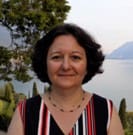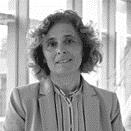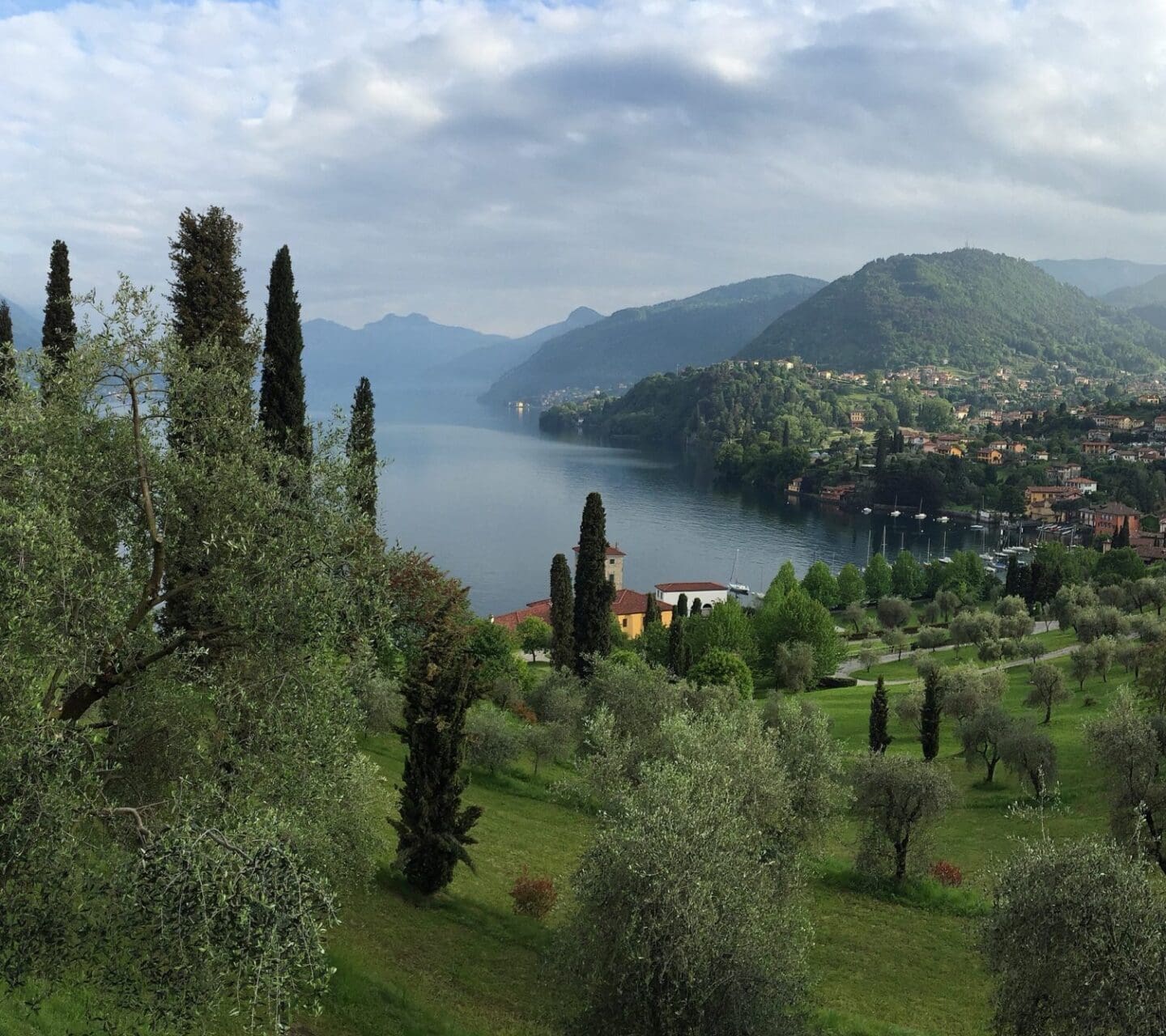These lawyers, researchers, and academics are committed to solving gender-based violence against women in Latin America. They formed a network of engaged change-makers after their time at Bellagio.
 Daniela Kravetz is a lawyer specializing in human rights, international criminal law and gender violence. She has served as the Special Rapporteur for Eritrea on the UN Human Rights Council and has worked for the Office of the Prosecutor for the International Criminal Tribunal for the Former Yugoslavia. Daniela currently works to support domestic prosecutions of atrocity crimes in several countries in Latin America.
Daniela Kravetz is a lawyer specializing in human rights, international criminal law and gender violence. She has served as the Special Rapporteur for Eritrea on the UN Human Rights Council and has worked for the Office of the Prosecutor for the International Criminal Tribunal for the Former Yugoslavia. Daniela currently works to support domestic prosecutions of atrocity crimes in several countries in Latin America.
 Claudia Martin is the co-director of the Academy of Human Rights and Humanitarian Law at the American University Washington College of Law (AUWCL). She is also a Professorial Lecturer-in-Residence, specializing in the Inter-American Human Rights system. Originally from Argentina, she has spent 30 years advocating for human rights in Latin America and the U.S.
Claudia Martin is the co-director of the Academy of Human Rights and Humanitarian Law at the American University Washington College of Law (AUWCL). She is also a Professorial Lecturer-in-Residence, specializing in the Inter-American Human Rights system. Originally from Argentina, she has spent 30 years advocating for human rights in Latin America and the U.S.

Susana L. SáCouto directs the War Crimes Research Office (WCRO) at the AUWCL, which promotes the development and enforcement of international criminal and humanitarian law. She is also a Professorial Lecturer-in-Residence, teaching at the intersection between gender and international criminal law.
Daniela, Claudia, and Susana work together as part of the Red Latinoamericana de Litigio Estratégico en Género (ReLeG; Latin American Network of Strategic Gender Litigation). ReLeG is made up of academics, activists and litigants who are committed to ending gender-based violence in Latin America. Its activity includes promoting strategic litigation initiatives on gender issues, contributing to legal education, and collaborating to build just public policy across the region.
ReLeG was established in 2020, but its future members – including Daniela, Claudia, and Susana – first met to discuss these themes at a convening at the Bellagio Center in 2017, organized by the WCRO and the Academy of Human Rights and Humanitarian Law. At this meeting, lawyers and academics from Argentina, Colombia, Chile, Guatemala, Mexico, and Peru met in order to identify local challenges and potential progress within the prosecution of sexual violence in their respective jurisdictions, with the intention of establishing a collaborative network of regional experts. Here, Daniela, Claudia and Susana discuss the outcomes of this convening in the context of their own careers.
Claudia: We all share a common interest in human and women’s rights. I used to work at the Inter-American Commission of Human Rights, which gave me the chance to deal with a large number of sexual violence cases. I was helping to draft these cases when the Inter-American Commission adopted one of the first rulings that considered sexual violence as torture, which was a considerable breakthrough at the time. Throughout the years, I kept that interest in trying to ensure that impunity was not affecting the cases of these women.
Susana: In 2008, we held a conference at AUWCL that brought together judges, prosecutors, and representatives of civil society organizations. We wanted to see how to improve upon the landmark decisions issued by the Yugoslav and Rwanda tribunals. These tribunals established, for example, that rape could constitute an act of genocide or a war crime. And different forms of liability could be attached to the perpetrators of sexual violence crimes. Yet, between 1998 and 2008, there was some regression in terms of the successful prosecution of such crimes. I was, for a time, working very closely with the Legal Advisor for Gender at the International Criminal Tribunal for the Former Yugoslavia (ICTY), Patricia Sellers. We asked ourselves, “What has gone wrong? Why were these cases not meeting the success they should have had after the landmark cases of 1998?” The 2008 conference saw the start of a process of reflection about these cases, which then moved into different regions, like Latin America.
Daniela: In the years before our Bellagio convening, I had been working on a project that documented the lessons learned at the Office of the Prosecutor at the ICTY, which progressed into a book called Prosecuting Conflict-Related Sexual Violence at the ICTY, published in 2016. I had also been involved as a prosecutor in cases at the ICTY concerning conflict-related sexual violence. After leaving the Office of the Prosecutor, I started working with domestic prosecution offices, like the Colombian Prosecution Office, and what I started seeing is that many of the same challenges that were faced at the international level were also replicated at the domestic level. So, at the time, my interest was in trying to bridge the gap between some of the developments occurring at the international level and the domestic level in Latin America, and how what we’d been learning in international prosecutions could be used to advance accountability efforts in the region. So, after many years of working as peers in complementary fields, we started discussing the possibility of going over past cases and exploring what had happened with a number of these cases at the domestic level. When we heard about the Bellagio Center, we realized we would all benefit from gathering and discussing different strategies to improve the chance of obtaining justice for victims.
We went to Bellagio with an explorative mindset, and did not expect the results we got, nor the bond we created with the other lawyers working on these cases.
Claudia MartinProfessional Lecturer In Residence and Co-Director, Academy on Human Rights & Humanitarian Law
Claudia: We went to Bellagio with an explorative mindset, and did not expect the results we got, nor the bond we created with the other lawyers working on these cases. Afterward, somebody came up with the idea of having a WhatsApp group, which grew into an amazing collaborative space that included people beyond our group. That, for me, was completely unexpected. We initially came together to explore what was going on with the cases and how we could help. But, after Bellagio, we continued to collaborate on many different levels.
Susana: We ended up drafting briefs on particular questions on gender and international criminal law in several domestic cases in Guatemala, El Salvador, and Peru. I think the work and the relationships developed precisely because of the strong bond created at Bellagio at that initial meeting. And we all participated as equal entities working from each of our specific areas toward common goals. A year after Bellagio, we discussed ways to strengthen and give more visibility to the work being done. That’s why we partnered with the Women’s Human Rights and Gender Section of the Office of the High Commissioner for Human Rights, who helped us plan and organize another convening, online in 2020. They helped us write a report about what strategic litigation means, and they supported the launching of the ReLeG website in 2021.
Claudia: And we have done this work without any resources, only the commitment to keep the network going because we feel it is an opportunity for people to get together and collaborate horizontally. We started with five or six countries because of the colleagues we knew. Now, there are many other countries involved. And we have colleagues who have asked to be involved because they see the benefit in participating, collaborating, and supporting each other’s cases. We are covering most of the Americas now. We aim to extend the network to cover every country. That’ll provide such a rich experience.
Susana: At the convening in 2017 and in the time since participants have raised exciting subjects for discussion that have resulted in workshops designed around different themes. What’s interesting is that they’re not confined to just strategic litigation themes – for example, one of our workshops focused on vicarious trauma, or secondary traumatization, for lawyers and others working with populations that have suffered from sexual- and gender-based violence. So some of the activities have gone far beyond the agenda initially explored at Bellagio.
Daniela: I’ve noticed that one of the ways our network has grown is that, at Bellagio, we were mainly discussing cases from the past – cases dealing with sexual violence in countries that had gone through periods of armed conflict or repression in Latin America. But the network has evolved with an increased interest in focusing on present-day cases of gender-based violence, including sexual and reproductive violence committed in contexts of social protests, migration, and by private actors. So, the network now looks at present issues, along with researching those of the past, to improve the future.
Claudia: When you have long-term colleagues who feel strongly about the same issues, you realize that you should be doing things together.
Daniela: We’ve also been brought together because we are all Spanish speakers. We are all interested in improving access to justice for victims of gender-based violence, in particular women, in Latin America.
Susana: Absolutely. We share and recognize this respect, commitment, and trust with each other. The shared experiences we had over the years were foundational to the collaboration and friendship we have today.
Explore More
We’d like to thank Daniela, Claudia and Susana for their continued contribution to the Bellagio network. You can find out more about the work of ReLeG at Bellagio.
Read an interview with Daniela about her work for Atlas in 2019.
Listen to Claudia explain the role and jurisdiction of the Inter-American Court of Human Rights, or find out more about the Academy on Human Rights and Humanitarian Law.
You can read Susana’s comments on current challenges in international criminal law, or find out more about her work with the War Crimes Research Office.
Related

September 2022
Welcome to the second Bellagio Bulletin, where you’ll learn of the many ways that the Bellagio Center has supported the work of the world’s leading thinkers. We, at The Rockefeller Foundation, are committed to gender equality and the Bellagio Center has helped us to advance the global gender equality agenda. The activities and conversations at […]
More